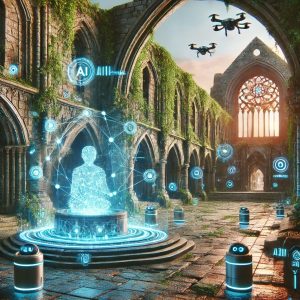Such artificial life does not yet exist on earth. However, we are faced with the emergence of non-biological intelligence, commonly known as artificial intelligence (AI). Today, I will take you on a journey charting possible versions of the future. The questions I will explore are: What differs AI from human intelligence? And the biggest philosophical questions concerning what it means to be human, with all these advance technology around us and this is just the beginning…
What makes us human? Our ability to think and learn? One might think so. Researchers in AI, however, are generally opposed to such a notion. They claim that the capability for memory, computation, learning and intelligence has nothing to do with human flesh and blood, let alone carbon atoms. Though there’s no universally accepted single definition. Machines might be increasingly able to outperform us in defined tasks such as playing chess, but human intelligence is uniquely broad. It can encompass skills like language learning and driving vehicles.
However, even though artificial general intelligence (AGI) doesn’t yet exist, it’s clear that intelligence isn’t just a biological faculty. Machines can complete complex tasks too. This means that it’s not only humans who can learn – the same rules and patterns could exist outside of the human brain too. AI researchers have made huge strides developing machine learning: machines that can improve their own software.
Artificial general intelligence (AGI) is the intelligence of a machine that has the capacity to understand or learn any intellectual task that a human being can. It is a primary goal of some artificial intelligence research and a common topic in science fiction and futures studies. AGI can also be referred to as strong AI or general intelligent action (Some academic sources reserve the term “strong AI” for machines that can experience consciousness.
So, if memory, learning, computation and intelligence aren’t distinctly human, then what exactly makes us human? As research in AI continues apace, this question is only going to prove harder to answer. AI is advancing rapidly and will impact human life in the near future. Machines aren’t anything new to humans. We’ve been using them for manual tasks for millennia. If you define your self-worth by your cognitive skills, such as intelligence, language and creativity, these machines pose no threat. However, recent breakthroughs in AI might begin to worry you.
I had my own little “holy-shit” moment when I saw Lilmiquela. A famous social media influencer with over 1,9 million followers. The only detail is: Lilmiquela is not real. She is an AI that feeds itself with how real social media influencers talk on social media. It takes another look to see she isn’t real. She also has real emotions, real girl problems, real thoughts about life and boys. Recently she even expressed about how painful it was that she split up with her boyfriend. What’s even more bizarre: people know she’s not real. Her makers don’t hide that she’s computer-generated. And yet, people connect with the fake persona, with the fake emotions, the fake heart-brokenness. The manipulation is pretty disturbing but she’s nothing more than a business model.
View this post on InstagramCada dia que passa eu me apaixono mais por você
A post shared by Miquela (@lilmiquela) on
Will these kind of fake influencers take over? Will this be the influencer marketing for the future? If you ask me its definitely a peculiar development – programming these persons and learning via AI what other influencers are doing. I’m still a big fan of realness and sometimes that means you can say something wrong but that makes us human. With fake persons on Social, it will be always easy for the brands because they can program you precisely how this fake person needs to act. Now its new… Lilmiquela is new… and then we want to try it out… and people like it but I don’t believe it will take over completely. It can replace some influencers or maybe as an addition on their Social Media Strategy but it’s not human. We are seeing that more and more things are taken over by AI and the time will come that you don’t really notice immediately if this person or account is fake or real.
And what do you think about the possibilities we are currently facing with Voice…. AI systems are also advancing quickly in the field of natural languages. Just consider how much the quality of translations provided by Google Translate has improved lately. It’s clear that AI will impact all areas of human life in the near future. Algorithmic trading will affect finance; autonomous driving will make transportation safer, smart grids will optimize energy distribution and AI doctors will change healthcare. The big issue to consider is the effect AI will have on the job market. After all, as AI systems can outperform humans in more and more fields, we humans may even become unemployable.
Let’s turn now to other potential impacts of AI development. Various AI aftermath scenarios are possible, ranging from the comforting to the terrifying. Whether we like it or not, the race toward AGI is underway. But what would we like the aftermath of attaining it to look like? For instance, should AI’s be conscious? Should humans or machines be in control? What about Deepak Chopra, he made a digital clone of himself, and other celebs could soon follow. Digital life after death. Deepak Chopra’s recent book, Metahuman, has already explored the transformation of human consciousness, and he sees his digital baby as being part of that vision.
We have to answer basic questions, as we don’t want to end up in an AI future for which we’re unprepared, especially one which could do us harm. There are various aftermath scenarios. These vary from peaceful human–AI coexistence to AI’s taking over, leading to human extinction or imprisonment. The first possible scenario is the benevolent dictator. A single benevolent super intelligence would rule the world, maximizing human happiness. Poverty, disease and other low-tech nuisances would be eradicated, and humans would be free to lead a life of luxury and leisure.
So, what could happen.. Humans and machines would peacefully coexist. This would be achieved through clearly defined territorial separation. Earth would be divided into three zones. One would be devoid of biological life but full of AI. Another would be human only. There would be a final mixed zone, where humans could become cyborgs by upgrading their bodies with machines. This scenario is a little fantastical, however, as there’s nothing to stop AI machines disregarding humans’ wishes. It’s posited that the subjective AI experience could be richer than human experience. Intelligent machines could be purposed with a broader spectrum of sensors, making their sensory experience far fuller than our own. Additionally, AI systems could experience more per second because an AI “brain” would run on electromagnetic signals traveling at the speed of light, whereas neural signals in the human brain travel at much slower speeds.
It might seem like a lot to wrap your head around, but one thing is clear: the potential impact of AI research is vast. It points to the future, but it also entails facing some of humankind’s oldest philosophical questions. The race for human-level AI is in full swing. It’s not a question of if AGI will arrive, but when. We don’t know what exactly will happen when it does, but several scenarios are possible: humans might upgrade their “hardware” and merge with machines, or a super intelligence may take over the world. One thing is certain – humanity will have to ask itself some deep philosophical questions about what it means to be human.
Love, Marietta
Source: Life 3.0 by Max Tegmark


